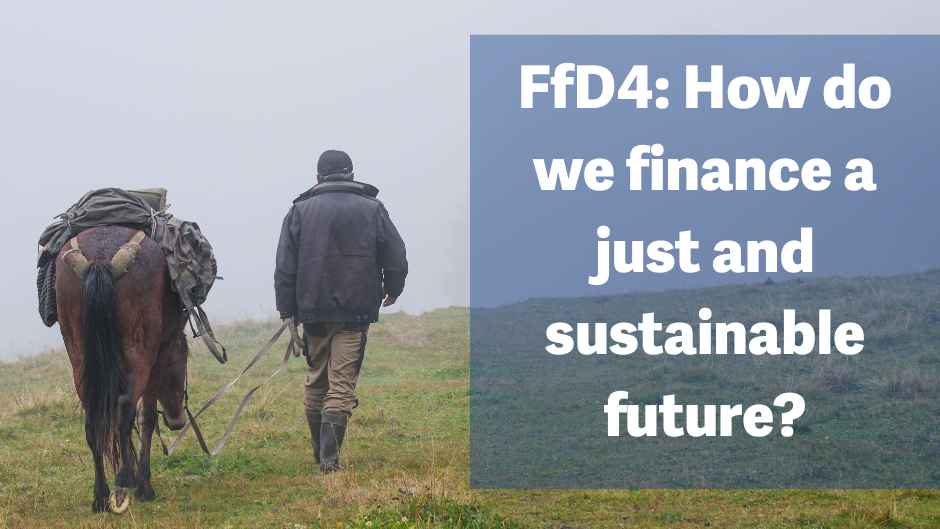FFD4 in Seville: A Pivotal Moment for Global Finance – But Will Action Follow Rhetoric?
Published: Jul 8, 2025 Reading time: 4 minutes Share: Share an articleLast week, the Fourth International Conference on Financing for Development (FFD4) convened in Seville, Spain. This conference brought together governments, international institutions, civil society, and private sector actors to address the urgent question: How can we finance a just, sustainable future?

While the official outcome document—the Compromiso de Sevilla/The Seville Commitment—was pre-agreed before the conference, unfortunately, it is quite weak in terms of real commitment. Nevertheless, some sparks of hope came from the Sevilla Platform for Action (SPA): over 130 voluntary initiatives will tackle the intersecting crises of climate change, debt, and development finance.
But as the conference—which likely cost most 100’s of millions of Euros—fades, there remains one vital question:
Will these initiatives lead to real change, or have we witnessed another cycle of promises without commitment?
Climate: Justice Must Be More Than a Buzzword
Civil society groups were vociferous in advocating that climate justice cannot be divorced from economic justice. In addition, some states proposed new financial tools connecting debt and the SDGs. However, the Debt for Climate coalition made their presence felt with demonstrations and a clear message:
“We are here because we can't let the super-rich dictate their terms to the UN. We will not be silenced, and we are here to stay!”
The Global Solidarity Levies Task Force proposal for taxes on luxury air travel and private jets to fund climate and development goals was widely discussed at FfD4. It’s a bold idea—but will it gain traction? The answer is likely reflected in the number of conference participants who arrived in Seville by private transport.
Without real climate justice, there is a risk that climate finance will remain reliant on voluntary, market-based mechanisms rather than binding commitments from high-emitting nations.
Debt: An Issue of Justice, Not Just of Finance
At FfD4, it is natural that debt was front and centre. This is a vital global problem in a world where many countries spend more on debt servicing than on health or education. The SPA includes commitments to explore debt audits, fair restructuring frameworks, and debt-for-climate swaps.
A Global Hub for Debt Swaps for Development, hosted by the World Bank and the Debt Pause Clause Alliance, led by Spain, is a promising step. But civil society leaders remain sceptical.
There is a warranted concern that these mechanisms remain voluntary, technocratic, and slow—this is detrimental to communities with urgent needs today.
Private Sector Governance: Who’s Really in Charge?
Two major initiatives—FX EDGE (to reduce currency risk in development finance) and SCALED (to expand blended finance)—aim to mobilise private capital for the SDGs. But many civil society organisations have voiced concern about the outsized influence of corporate actors in shaping global finance. For example, Lidy Nacpil, Asian Peoples’ Movement on Debt and Development, noted that:
“We cannot allow the same financial actors who caused the crises to now lead the solutions. Governance must be democratic, not corporate.”
The risk here is clear: if governance reforms are driven by the same institutions that benefit from the status quo, change is unlikely; instead, we may see more financialisation, not more justice.
What’s Next?
The roadmap from Seville includes several phases:
Immediate (2025): Launch of initiatives and development of tracking mechanisms.
Medium-Term (2026): Progress reviews at the UN General Assembly and Financing for Development Forum.
Long-Term: Scaling successful models and pushing for systemic reform. Unfortunately, there are no binding commitments—and no finance—in place for this ambition.
None of these will happen without sustained pressure from civil society. The voluntary nature of the SPA means that accountability will depend on advocacy, transparency, and public engagement.
Final Thoughts
FFD4 showed that there is no shortage of ideas, but the real test is political will. As we move forward, we must ask:
Will debt relief be delivered at the scale needed?
Will climate finance be fair, predictable, and accessible?
Will private sector involvement be governed by public interest, not profit?
Civil society has already shown it will not sit on the sidelines. The challenge now is to turn momentum into movement, and movement into meaningful change.
We must maintain pressure on policy- and decision-makers and ensure that Seville is remembered not just for what was promised, but for what was delivered.


